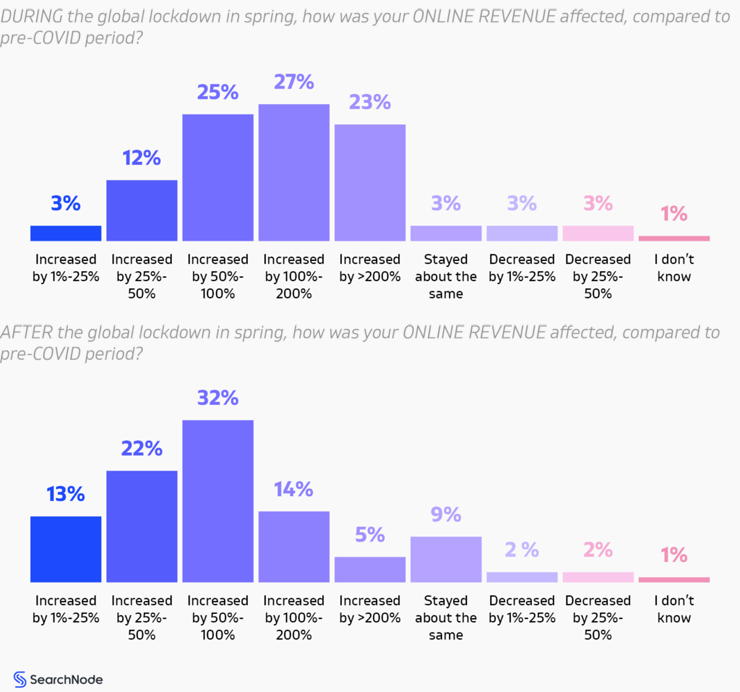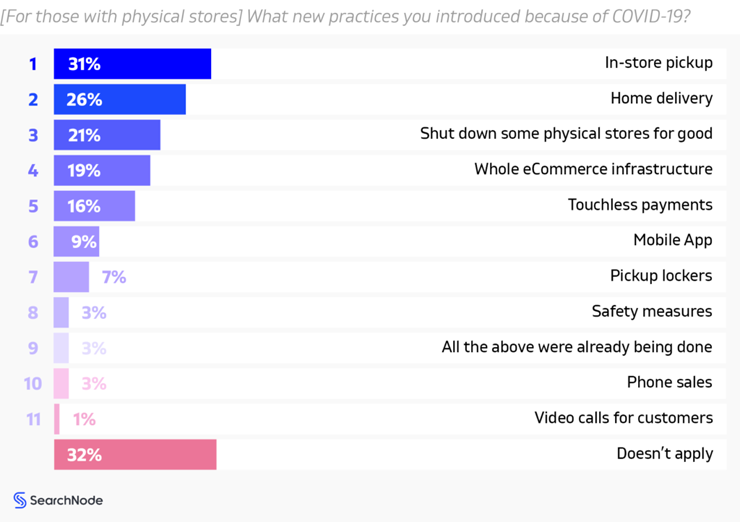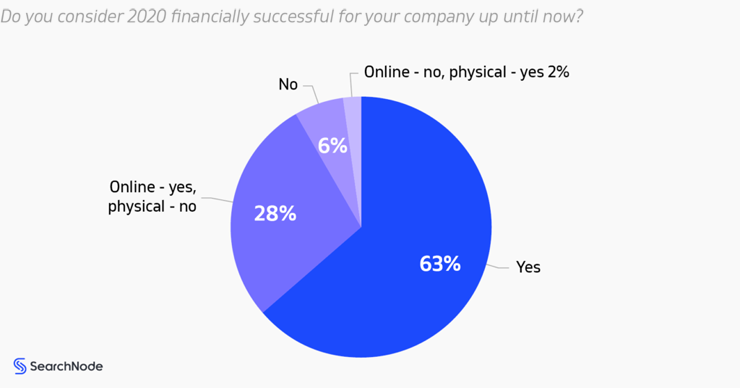The impact of Covid-19 on ecommerce

2020 was a challenging year for many. At the same time, ecommerce grew like never before. What can we expect from 2021? SearchNode published a new report on the latest ecommerce trends and the impact of Covid-19.
Last year, SearchNode published a report on ecommerce trends in 2020. Of course, back then there was little known about the coronavirus that would spread all across the globe. In the survey, there were lots of talks about Magento 2 (because from June 1, 2020, Magento would no longer support Magento 1), an improved focus on personalization and environmental sustainability.
2020 was, of course, all about Covid-19.
What has changed in twelve months? Let’s find out, as the Lithuanian tech company published a new report on ecommerce trends. In October 2020, the company questioned about 100 ecommerce decision-makers from Europe and North America.
6%: ecommerce revenue decreased during lockdown
Of course, there were questions about Covid-19. It seems that most ecommerce companies saw their online revenue increase during the global lockdown in the spring of 2020. According to the survey, 90% of companies saw their online sales increase at least a bit, with 50 percent of respondents claiming it grew by over 100 percent. But still, 6 percent say their ecommerce revenue decreased during the lockdown.
After the lockdown was over, many consumers started shopping at brick-and-mortar retailers again. Still, 86 percent of respondents say their online revenues increased and only 4 percent say it decreased.

Online profit margin increased for 38%
Generating online sales is one thing, the whole Covid-19 situation has also led to things like disrupted supply chains, poorly staffed customer service and more. This directly affects the online profit margin. It seems that for 38 percent of ecommerce decision-makers their online profit margin grew during the global lockdown, while for a similar percentage (40 percent) the situation stated about the same. Only 15 percent claimed that it decreased.
Looking for ecommerce software to start selling in Europe? Webador and Shopify are platforms that are well optimized for cross-border ecommerce.
The impact of Covid-19 on the workforce
The pandemic has, of course, also led to some changes in companies’ workforce. About 44 percent said they had to relocate staff, while three in ten hired more people. The other side of the coin is that 26 percent had to fire some people and 15 percent say they had to reduce their employees’ salaries. And maybe a bit surprising for some, but 5 percent managed to increase salaries. And even more surprising: 21 percent of companies didn’t adjust their workforce at all.
21% of companies didn’t adjust their workforce.
23% of omnichannel players saw offline sales increase
Another interesting finding from the study is that for retailers that have both online and offline stores, 23 percent say their offline sales increased and 16 percent managed to keep it similar. Unfortunately, for 43 percent their offline sales took a hit.
Measurements for physical retailers
Many brick-and-mortar retailers had to drastically change their business if they wanted to avoid to go out of business. So, many new practices were introduced last year. Among the participants, 31 percent introduced in-store pickup, while 26 percent chose to introduce home delivery. Unfortunately, about one in five had to shut down some physical stores for good.

All in all, the coronavirus has heavily impacted online retailers on different levels. Among the main challenges for ecommerce businesses, disrupted supply chains and fulfilling demand for products were the mostly mentioned ones. But limited operations due to the lockdown, managing inventory, and overall lack of employees were also some key challenges for online retailers. And 17 percent said it was challenging because they need to close their physical stores.
A disrupted supply chain was the main challenge for many online retailers in Europe.
Shifted strategies
Last year, many respondents said they would mostly implement, improve or change personalization, site-search and omnichannel. This year, the strategic vision has, of course, shifted due to Covid-19. Most of the companies (45 percent) will now have more focus on the digital part of their business, by adjusting assortment, investing in new ecommerce software or focusing more on online marketing channels.
Looking for ecommerce software to start selling in Europe? Webador and Shopify are platforms that are well optimized for cross-border ecommerce.
One in five said they would intensify actions, meaning they need to execute their strategies and act faster. One in ten say they are now focused more on physical stores adjustments, and 8 percent went for supply chain adjustments, from minor ones to completely new supply chain or logistics.
Financial consequences
Despite all the bad things happening due to the outbreak of the coronavirus, financially 2020 wasn’t so bad for many ecommerce companies. Most of them (63 percent) say the year (up to October) was successful. And 28 percent claim their ecommerce business was doing well, while their physical stores didn’t. And a surprising 2 percent said the opposite!


Comments